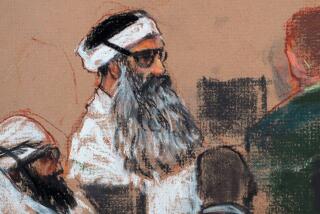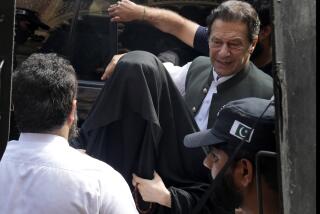Hamas-aid case draws split verdict
CHICAGO — A federal jury reached a split verdict Thursday in the case of two men accused of aiding the militant Palestinian group Hamas.
Jurors acquitted Muhammad Hamid Khalil Salah and Abdelhaleem Hasan Abdelraziq Ashqar of racketeering conspiracy but convicted them of lesser charges in a case the government had said was a major prosecution in its war on terrorism. The indictments were announced in 2004 at a news conference by then-Atty. Gen. John Ashcroft.
As the not-guilty verdict on the most serious count was read, the defendants’ supporters in the courtroom gasped.
Salah appeared to fight back tears, and later, outside the courtroom, he and Ashqar were embraced by family and friends.
“It is better than we thought,” Salah said. “We are good people, not terrorists.”
Salah, 53, was convicted of obstruction of justice for giving false answers to questions in a civil lawsuit. Ashqar, 48, was convicted of criminal contempt and obstruction of justice for refusing to testify before a federal grand jury when he had been given immunity from prosecution for anything he might say. Possible sentences range from probation to 10 years in prison, with a hearing set for June 15.
Jurors deliberated three weeks before reaching a verdict in the three-month trial.
Defense attorneys immediately declared victory in the case.
“This is a great day for justice,” said Michael E. Deutsch, who represented Salah in the trial.
Assistant U.S. Atty. Gary Shapiro told reporters in Chicago: “We’ve convicted them. It’s hard to say that we’re disappointed.” The Justice Department in Washington declined to comment on the verdict.
Salah, a former grocer from the Chicago suburb of Bridgeview, was accused of using his U.S. citizenship to facilitate the transportation of hundreds of thousands of dollars to militants in the West Bank and Gaza in the early 1990s.
Ashqar, a former university professor from Alexandria, Va., was accused of acting as a Hamas archivist who collected key documents and facilitated communication among Hamas members around the globe.
Much evidence in the case came from FBI wiretaps and raids conducted in the early 1990s under the Foreign Intelligence Surveillance Act.
The case drew attention in the legal community partly because of the decision of U.S. District Judge Amy J. St. Eve to let two Israeli interrogators testify for the prosecution under aliases and in disguises, in a courtroom that she closed to the public. Experts say it is extraordinary to keep witnesses’ identities secret even from defense attorneys.
St. Eve said that the right to learn a witness’ identity was “not absolute” and that the use of pseudonyms for the Israeli agents was justified because of their assignments.
The primary evidence against Salah was his 1993 confession to the Israeli agents, after he was arrested at a Gaza checkpoint and accused of providing money for Hamas members. Deutsch urged jurors to reject Salah’s confession, arguing it was extracted after 54 days of Israeli torture.
Statements Salah made in Israeli custody linked him closely to the hierarchy of Hamas, including top Hamas official Mousa Mohammed Abu Marzook. Prosecutors provided bank records showing that Abu Marzook, a fugitive living in Damascus, Syria, sent Salah nearly $1 million in the early 1990s.
That money was intended to fund violence, prosecutors alleged. The defense countered that the money was meant to aid destitute Palestinians living under an oppressive occupation.
Prosecutors alleged that Salah personally delivered some $240,000 to militants. When he was captured outside Gaza, $100,000 in cash was in his Jerusalem hotel room.
The two Israeli interrogators, testifying under aliases, swore during the trial that Salah was well treated in custody, in part because he was a high-profile U.S. citizen. They described a compliant and cooperative Salah trying to trade information about Hamas for the release of Hamas members from Israeli prisons and other benefits.
Based on his confession, Salah spent four years in an Israeli prison before being released and returning to Bridgeview.
More to Read
Sign up for Essential California
The most important California stories and recommendations in your inbox every morning.
You may occasionally receive promotional content from the Los Angeles Times.










